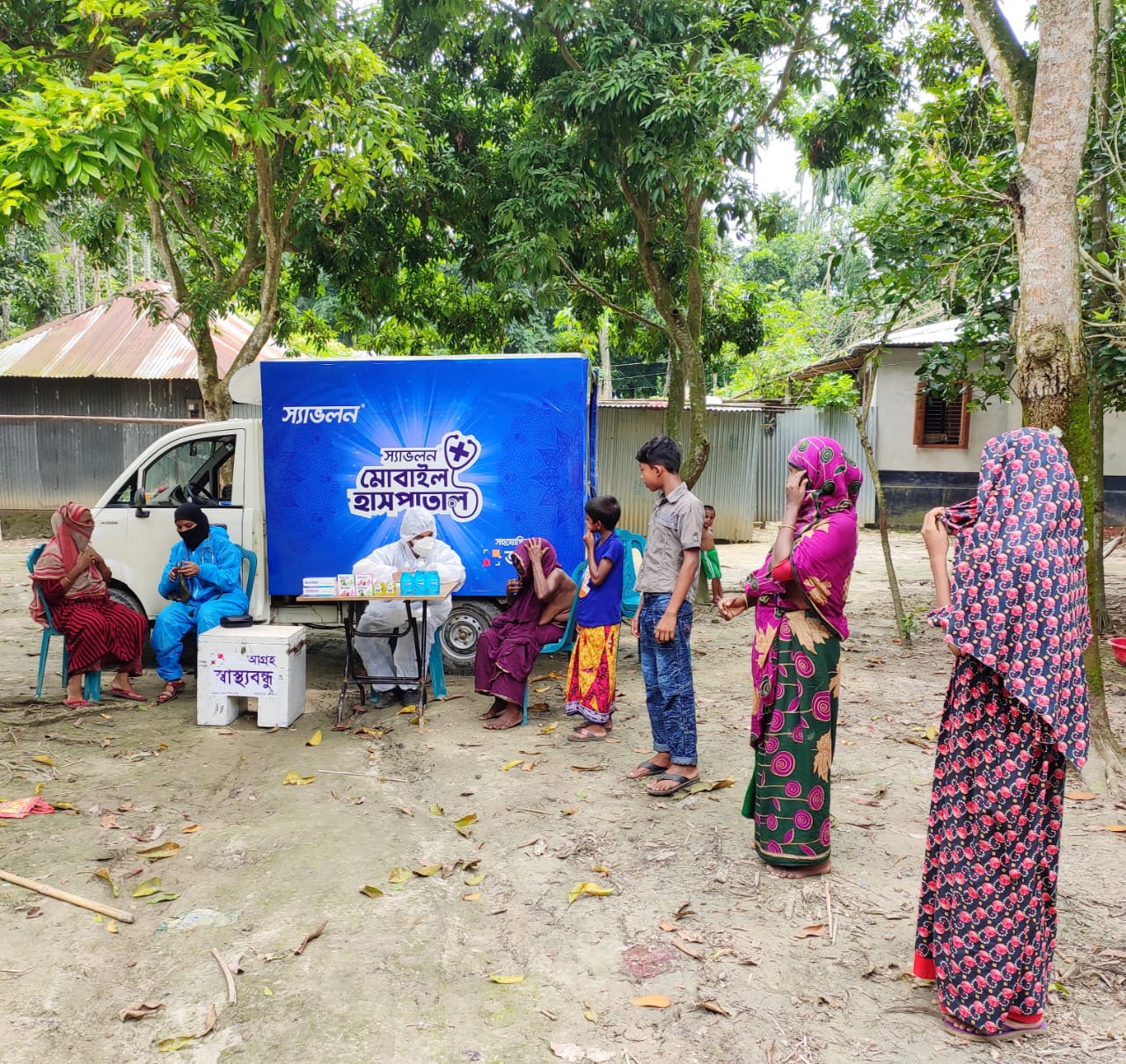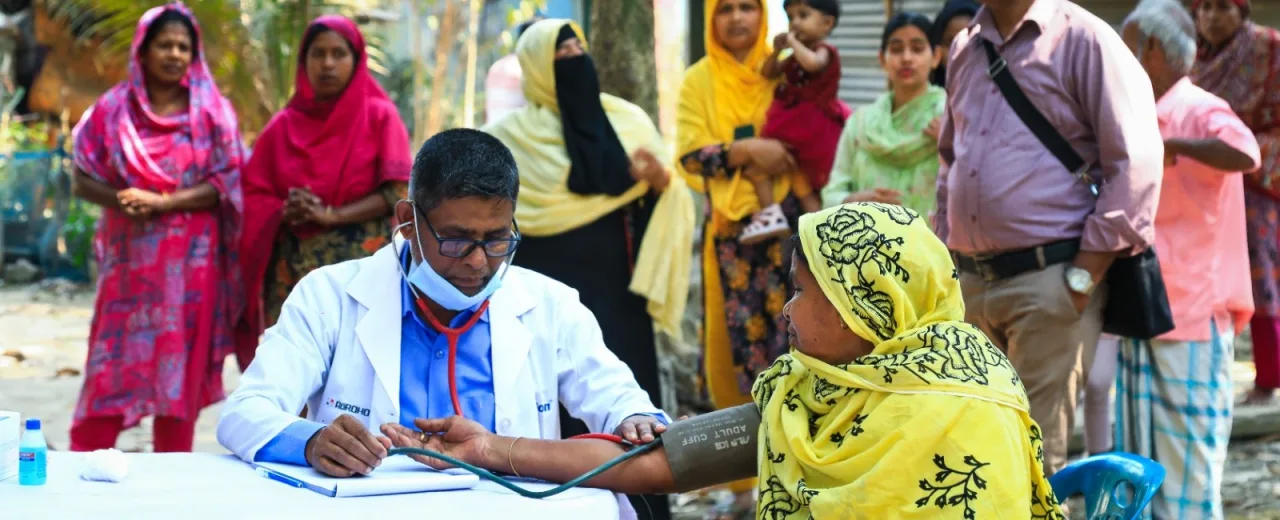 Mobility for greater health
Mobility for greater health
A hospital that comes to its patients
Rida is one of four million textile workers in Bangladesh. While she lives with three colleagues in a small room near her factory, her three children live with their mother. Makhulia, the village Rida comes from, is located in the Savar region. It is isolated and has no direct access to local or long-distance public transport. The nearest hospital is three hours away by car. To get there, one must be able to afford transportation to the bus stop and the ticket to the city - neither of which is easy for people in Makhulia. Therefore, when Rida or her children get sick, the hospital comes to them. The mobile hospital is a converted van equipped with an extensive pharmacy and medical equipment. Here, the residents of Makhulia and other villages are treated free of charge.
Necessity
Easily accessible, free medical care for the population of the rural regions of Savar, Dhamrai and Santal in Bangladesh
Activity
Doctors come directly to the villages with a mobile hospital and pharmacy and treat acute and long-term ailments of the inhabitants free of charge
Countable effort
Number of hours of medical examinations and treatment of people by the mobile hospital
Result
The health situation of the people has greatly improved due to the easily accessible, regular treatments and check-ups
Systemic effect
Free treatment and generally improved health increase the quality of life and life expectancy of people in rural Bangladesh
Background
Textile factories like the one where Rida works consume a lot of water in and around Dhaka, which is not available to the local population and also to the textile workers and their families. In addition, the handling of wastewater, especially in the textile industry, is hardly regulated, which leads to unfiltered wastewater further poisoning the groundwater (Sustainability, 2019). Furthermore, the available water sources are burdened by severe salinisation of the groundwater. This is due to a rise in sea level caused by climate change, which also results in floods and inundations (Christiane Grefe, 2014). For lack of alternative water sources, people still drink contaminated or salinated water and also use it for cooking and washing. In order to counteract the basic problem, a project was supported with the 24 Good Deeds Advent Calendar 2022 to provide textile workers in the Dhaka region with clean drinking water via water filters in the long term. However, many people are already ill or live in places without safe access to drinking water. Which is why this good deed is intended to add an important component to the water filters.The health consequences of polluted drinking water range from skin irritations, gastrointestinal disorders and poisoning to serious respiratory diseases and cancer (Sustainability, 2019). These conditions are often untreatable and worsen because those affected have no or very limited access to basic medical care. Medical care by doctors and hospitals in Bangladesh is below average compared to the rest of the world. There are 0.8 hospital beds per 1,000 inhabitants in the country. The global average is 2.9 beds (The World Bank, 2016). There are also only 0.7 doctors per 1,000 inhabitants. Worldwide, there are 1.6 doctors per 1,000 inhabitants (The World Bank, 2020). This is where the mobile hospital comes in. Water-based diseases, but also all other ailments of the textile workers and their families and neighbours, should be treated better as far as possible through the mobile services.
The good deed
In order to improve medical care on the ground, the local NGO AGROHO has set up a mobile hospital that comes directly to the patients and carries everything that might be needed. Currently, the hospital mainly visits villages in the regions of Savar, Dhamrai and Santal, where the average income is far below the national average. The hospital, which is housed in a van, is equipped with a treatment bed, medical instruments and equipment as well as an extensive pharmacy. It is accompanied by a team of 2 doctors, 2 nurses and 1 nursing assistant who visit 3-4 villages 6 days a week. Each village is visited at least once every 2-3 months. Up to 100 patients are treated in one day. Since 2018, this has been more than 718,000 people who would otherwise not have received medical care. In 2024, with the help of your good deed, at least 20,000 more patients are to be added.

About Bangladesh
Dhaka
Capital
171,186,372
Number of inhabitants
2,688.3
Gross domestic product per capita per year
0,661
Human Development Index
In Bangladesh, farmers are reviving a centuries-old tradition. They grow their crops on floating beds in response to the increasing floods.
About the organization and further information
Association
Drip by Drip e.V.
Website
Further information and source
- The World Bank, 2016. Hospital beds (per 1,000 people) - Bangladesh, The World Bank Data, Washington DC
- The World Bank, 2020. Physicians (per 1,000 people) - Bangladesh, The World Bank Data, Washington DC
- Mostafiz Uddin, 9. Oktober 2017. Nachhaltiger Umgang mit Wasser in Bangladesch, textile network, Bamberg
- Christiane Grefe, 24. April 2014. Am schlimmsten ist die Versalzung, Zeit Online, Hamburg
- Sakamoto M., Ahmed T., Begum S., Huq H., 2. April 2019. Water Pollution and the Textile Industry in Bangladesh: Flawed Corporate Practices or Restrictive Opportunities?, Sustainability 2019




